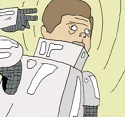|
I met w a Brit management consultant today who was telling me about the time he was locked in a room at 101 and screamed at by a Major-General to sign a proposal to outsource all expeditionary logistics above Bde level as a cost-saving measure and to keep official deployed troops numbers lower for OOTW. The reason they (Govt) bring consultants in is to monitor “efficiency”, and to make sure the big green machine is exercising fiduciary responsibility to Canadian The management consultants were the ones that pointed out that if we do this in OOTW, even if it works “well”, we’re in trouble in, well, W, because the civvie contractors will get the gently caress out of there. I can only guess that his firm wasn’t going to make short term profits on signing off on it, because I can’t see McKinsey telling the govt not to privatize the tail. The system is still stupid enough to give the suits auditing big army veto power, so the plan that probably would have made the MajGens career never went ahead. Not sure how I feel about that because it means a million other, stupid, plans the suits liked went ahead over uniformed objections. But yeah, the guy says he was kept in this conference room, getting beasted by a red faced logistician, with the papers in front of him, until the time on his visitor pass expired and his escort came to walk him out. Could be a Grover type embellishment, could be legit, but it was a good story. Frosted Flake has issued a correction as of 18:03 on Jan 30, 2024 |
|
|
|

|
| # ? Jun 3, 2024 11:41 |
|
SixteenShells posted:Samwise shouldn't even know what potatoes are. The LotR cycle was intended to be a faux mythology for prehistoric Europe, while potatoes are a New World crop. He should be lauding turnips or something. Nah, the potatoes are in the books too
|
|
|
|
JAY ZERO SUM GAME posted:love to almost die escorting the Burger King For king and country.
|
|
|
|
Kassad posted:Nah, the potatoes are in the books too no, I clearly remember Sam talking about more naked hoes
|
|
|
|
DancingShade posted:For king and country-fried steak.
|
|
|
|
Cerebral Bore posted:when you're wounded and left on afghanistan's plains
|
|
|
|
Frosted Flake posted:It’s all been contacted out. aaaaaAAAAAAAAAAHHHHHH
|
|
|
Frosted Flake posted:It’s all been contacted out. Achievement unlocked: Died for Burgertown
|
|
|
|

|
|
|
|
|
https://www.foreignaffairs.com/united-states/cia-spycraft-and-statecraft-william-burns William Burns: Spycraft and Statecraft quote:For as long as countries have kept secrets from one another, they have tried to steal them from one another. Espionage has been and will remain an integral part of statecraft, even as its techniques continually evolve. America’s first spies spent the Revolutionary War using ciphers, clandestine courier networks, and invisible ink to correspond with each other and their foreign allies. In World War II, the emerging field of signals intelligence helped uncover Japanese war plans. During the early Cold War, the United States’ intelligence capabilities literally went into the stratosphere, with the advent of the U-2 and other high-altitude spy planes that could photograph Soviet military installations with impressive clarity. quote:PUTIN UNBOUND quote:XI'S POWER PLAY quote:A FAMILIAR ENTANGLEMENT quote:SPIES LIKE US quote:SMARTER SPIES quote:IN THE SHADOWS
|
|
|
|
Frosted Flake posted:It’s all been contacted out. JAY ZERO SUM GAME posted:love to almost die escorting the Burger King Owlbear Camus posted:It is the 19th century. I am getting killed by mountain tribesmen in Afghanistan in service of The King. Cerebral Bore posted:when you're wounded and left on afghanistan's plains
|
|
|
|
Officer Sandvich posted:https://www.foreignaffairs.com/united-states/cia-spycraft-and-statecraft-william-burns That's a lot of words to say "its not our fault, don't blame us, this is really hard and the dog ate my homework". Also: future AI will fix everything. Just like it will fix everything else! AI!
|
|
|
Officer Sandvich posted:https://www.foreignaffairs.com/united-states/cia-spycraft-and-statecraft-william-burns Didn't read
|
|
|
|
|
In former CIA agent Doug Laux's Left of Boom, he said that in 2009 the agency didn't even have any Pashtun speakers in Afghanistan, and he found out about some Pakistani general dying before the agency did simply because he could read local newspapers.
|
|
|
|
|
i think china is just gonna sit there and make a paradise while we go more completely insane.
|
|
|
|
given how hollowed out most institutions have become, hard to imagine its any different at the letter agencies
|
|
|
|
Cerebral Bore posted:when you're wounded and left on afghanistan's plains lmao
|
|
|
|
Officer Sandvich posted:https://www.foreignaffairs.com/united-states/cia-spycraft-and-statecraft-william-burns What I'm getting is that a bunch of people are going to fall out of windows in Russia, and it'll out that they're all CIA spies who used the exact same app on their iPhones that got compromised by some MSS trap. Also good to know that the CIA is so ideologically poisoned that they'll just ignore Russia strengthening its means of production right in front of them.
|
|
|
|
BULBASAUR posted:given how hollowed out most institutions have become, hard to imagine its any different at the letter agencies CSIS and CSE are also increasingly turning to contractors for nearly everything because Intelligence Officers are public servants with defined benefits and compensation. I can't imagine the American agencies are much different.
|
|
|
|
|
|
|
Danann posted:What I'm getting is that a bunch of people are going to fall out of windows in Russia, and it'll out that they're all CIA spies who used the exact same app on their iPhones that got compromised by some MSS trap. Trump already leaked the NOC list 
|
|
|
|
|
Danann posted:What I'm getting is that a bunch of people are going to fall out of windows in Russia, and it'll out that they're all CIA spies who used the exact same app on their iPhones that got compromised by some MSS trap. quote:That tragic and brutish fixation has already brought shame to Russia and exposed its weaknesses, from its one-dimensional economy to its inflated military prowess to its corrupt political system. the entire west tried to economically obliterate russia using every weapon available and it simply shrugged it off as the slap of a paper tiger it was anyway it's russias economy thats one dimensional
|
|
|
|
Real hurthling! posted:i think china is just gonna sit there and make a paradise while we go more completely insane. Doesn't need to be paradise just better than what we're offering. I.e. nothing but declining living standards, high inflation, no home ownership, no future, cyberpunk without the cool cybernetics. Not a high bar to cross lets be honest.
|
|
|
|
skooma512 posted:Trump already leaked the NOC list It's called declassifying when head honchos do it. It's only a leak when you or I do it.
|
|
|
|
Danann posted:What I'm getting is that a bunch of people are going to fall out of windows in Russia, and it'll out that they're all CIA spies who used the exact same app on their iPhones that got compromised by some MSS trap. they have been paranoid hunting leakers since their formation thinking they're being Outspied and need to crank up the paranoia when it's just them doing coke and never noticing how Not Subtle they are
|
|
|
|
quote:That tragic and brutish fixation has already brought shame to America and exposed its weaknesses, from its one-dimensional economy to its inflated military prowess to its corrupt political system.
|
|
|
|
Effeminate upper class British voice: Those brutish Russians!
|
|
|
|
Frosted Flake posted:It's funny that Warhammer Fantasy is more committed to the parallel and so has the not-Americas populated by lizardmen. LotR was content to say that the Columbian Exchange had already taken place or never been required. always appreciated that they wrote not-North America to be ruled by the most gratuitously vile, arrogant, vicious slavedrivers in the setting, who broke away from the previous world empire, and now despoil every place with a coastline from massive warships that resemble floating cities.
|
|
|
|
yeah the warhammer guys get props for admitting brits are not human
|
|
|
|
FirstnameLastname posted:they have been paranoid hunting leakers since their formation thinking they're being Outspied and need to crank up the paranoia when it's just them doing coke and never noticing how Not Subtle they are trump getting intelligence briefings out in the open at mar a lago was the funniest poo poo and i can't wait for it to happen again
|
|
|
|
NeoCons wanting to invade Iran
|
|
|
|
https://www.youtube.com/watch?v=U7s5pT3Rris
|
|
|
|
Pomeroy posted:always appreciated that they wrote not-North America to be ruled by the most gratuitously vile, arrogant, vicious slavedrivers in the setting, who broke away from the previous world empire, and now despoil every place with a coastline from massive warships that resemble floating cities. Strictly speaking isn't Naggaroth not-Canada?
|
|
|
|
Z the IVth posted:Strictly speaking isn't Naggaroth not-Canada? in terms of description it’s all frozen wastes but on the maps it’s all of not north america
|
|
|
|
Question for the thread, what's America's most MICbrain war in recent history? What is the war that make the lease sense even if you win it, that has the lowest potential return to actual cost ratio? If I just simple compare the geopolitical importance of Korean peninsula/Vietnam/Iraq/Afghanistan regions, Vietnam's geopolitical important is just way lower than Afghan and Korea. Even if you win the war, you only hold the lower plain area of Indochina peninsula. You cold war opponent can still easier attack you from the Laos mountains and easily cut it off from the narrow middle. And you win it to defend what? Thailand? The whole domino theory is just a dumb pitch to keep the MIC money rolling. And to top it off, that was before American switched from gold standard to a debt-based monetary policy, the US dollar was real money back in the 60s and 70s. If you tell me the US government in the 60s was controlled by "Sons of Patriots" secret society, I'd believe it.
|
|
|
|
Real hurthling! posted:yeah the warhammer guys get props for admitting brits are not human The humans suck in warhammer
|
|
|
|
stephenthinkpad posted:Question for the thread, what's America's most MICbrain war in recent history? What is the war that make the lease sense even if you win it, that has the lowest potential return to actual cost ratio? The decades long support of the Khmer Rouge because we wanted to keep the Vietnam War going is high up on the list. Look up who the US supported to hold Cambodia's UN seat as late as 1993.
|
|
|
|
Real hurthling! posted:yeah the warhammer guys get props for admitting brits are not human isn’t Britain in warhammer a land of subhuman swampmen who have less lore than warhammer China did before the total war games
|
|
|
|
stephenthinkpad posted:Question for the thread, what's America's most MICbrain war in recent history? What is the war that make the lease sense even if you win it, that has the lowest potential return to actual cost ratio? Just wanted to comment on the gold backed side of this. Michael Hudson’s insight in Superimperialism is that spending US dollars overseas primarily was done through military spending, both direct in terms of actively fighting a war in the case of Korea onwards, and the American occupation of states like Japan and Germany. Those dollars were “convertible”, meaning it could be traded for gold by foreign governments who received dollars. However, due to the U.S. essentially supplying raw material to the world post-WW2, governments needed dollars to pay for US goods - thus, it was useful to keep dollars on hand rather than gold, which would just go back to the U.S. anyway for raw materials. It’s a huge oversimplification, but that’s one of the early factors that led to a dollarized world economy, and led to the phrase of the “dollar being good as gold”. By Vietnam, this situation became undone. As Hudson says, France recognized the hegemony that the U.S. had, and because fighting the Vietnam war was extremely costly, the dollars entering French Indochina banks were being regularly sent back to the U.S. to be converted to gold. By depleting the U.S. gold reserves, this put immense pressure on USD, driving it downwards. One of the more interesting dynamics of Vietnam was reaction of Wall Street - they locked hands with anti-war protestors to protest the erosion of sovereignty happening due to the immense cost of the war - opposed to that were the trade unions who were benefitting from the MIC ramp up https://amp.theguardian.com/theguardian/2012/oct/16/wall-st-bankers-against-vietnam-war-1969-archive quote:Bankers join forces with hippies and folk singers against the Vietnam war Between the draft, immense unpopularity, unwinnable goals and then finally, the main impetus to remove the U.S. from the gold standard so the French would stop doing their run on us, it might be one of the stupidest wars. We also lost, so there’s that dk2m has issued a correction as of 20:27 on Jan 31, 2024 |
|
|
|

|
| # ? Jun 3, 2024 11:41 |
|
PawParole posted:NeoCons wanting to invade Iran I'm generally a pro-dog guy, but the dog in this photo...it has bad vibes. A really hosed up dog.
|
|
|










































